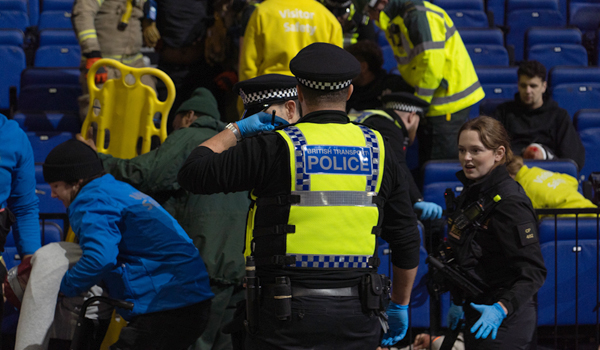Biggest ever ‘live-play’ major incident exercise held at The O2
The Metropolitan Police Service (MPS) and emergency service partners in London have taken part in one of the largest ‘live-play’ major incident training exercises ever held in the capital.
The multi-agency exercise held at The O2 in Greenwich, which is home to one of the world’s most iconic arenas, involved more than 1,000 people including responders from blue-light services, counter-terrorism investigation teams, and The O2 security staff, as well as numerous volunteers playing the role of members of the public caught up in the notional terrorism incident.
By hosting the exercise at The O2, the exercise gave emergency responders and the venue’s staff and security teams vital experience of dealing with a major incident at a real-life location and the many challenges that presents.
The MPS said the exercise “was not being carried out in response to any specific threat or intelligence”.
MPS Chief Superintendent Kris Wright, who directed the exercise, said: “The challenges of dealing with any major incident at a venue on the size and scale of The O2 are extraordinary. The learning that we, our emergency services colleagues, local partners and The O2 have gained from this exercise has been invaluable.
“This not only benefits us in London, but we will share any learning we can with other emergency services and concert venues across the country.
“I would like to thank the team at The O2, who have given us this fantastic opportunity to test officers and staff in what is the biggest indoor arena in London.
“It’s a testament to their commitment to public safety, and this experience will undoubtedly strengthen the cooperation between all those who operate in or around the venue – both in our day-to-day activities, but also should a major incident response ever be required.
“I want to emphasise that this was also not carried out in response to any specific threat or intelligence. The terrorism threat level across the UK is at ‘substantial’ so we always need people to be vigilant, but I hope this reassures Londoners that should the worst happen, that we are ready and prepared to respond in the best possible way.”
Assistant Commissioner Pat Goulbourne of the London Fire Brigade, said: “Training in realistic venues with providers and our emergency service partners in the police and ambulance service ensures that we’re able to provide our best service to London. Exercises like this mean that when our firefighters are mobilised alongside our partners, they will know how each organisation responds to terrorism, and it tests our capabilities and coordination.
“Through an investment in our firefighters and equipment, all of our crews are now better trained and equipped to deliver an enhanced response to acts of terror and violence. Every firefighter in London, over 4,000 in total, has received new training in this area, and we will build on that training as we continue to exercise with our emergency service partners.”
Chief Paramedic for London Ambulance Service (LAS), Pauline Cranmer, added: “As London’s emergency and urgent care responders, we must be prepared for a range of major incidents. This includes everything from building fires and transport accidents to severe weather and terrorism.
“Paramedics in our Tactical Response Unit and Hazardous Area Response Team are experts in providing life-saving care for Londoners in dangerous situations and attend over 8,000 incidents a year.
“Exercises like this one at The O2 require a lot of planning and specialist skills from our emergency planning team to ensure that our ambulance crews, control room staff and commanders are ready to respond to incidents across the capital.”
Paul Williams, director of Safety, Security and Risk at The O2, said the safety of guests, staff and performers “is always a priority”.
“We are constantly reviewing our processes to ensure we provide a best in class experience for everyone,” he said
“The incident training exercise, which is part of our Readiness and Testing Programme, gave us a unique opportunity to rehearse a major emergency procedure and to reinforce our partnership with the emergency services and other agencies. I would like to thank the Metropolitan Police, and all the emergency services and agencies for their support and willingness to work together on this crucial exercise programme.”
The scenario was based on a notional terrorism incident taking place inside the arena, which required an initial response by police to confront the immediate threat to the public, and then an ongoing response to assist and deal with casualties and those impacted and involved.
The exercise, held on January 14, involved players from the MPS as well as Counter Terrorism Policing Head Quarters, London Fire Brigade, London Ambulance Service, NHS England, City of London Police, British Transport Police, Transport for London, London Resilience and Greenwich Local Authority.
As well as testing the on-the-ground response, it also tested the command and control elements, with players taking part from respective control rooms right across the capital.
The O2 tested the capability of its security staff to communicate with people in the arena, and the general public, and to effectively respond to the incident in coordination with emergency services.
It comes as part of the MPS’s ongoing programme of testing and exercising various major incident and terrorism scenarios and is also part of ongoing work to implement Lord Harris’ recommendations for London’s preparedness to respond to a Major Terrorist Incident.


